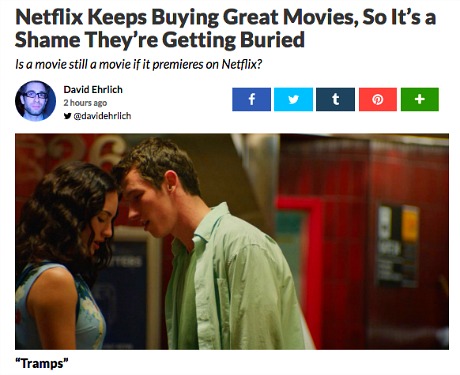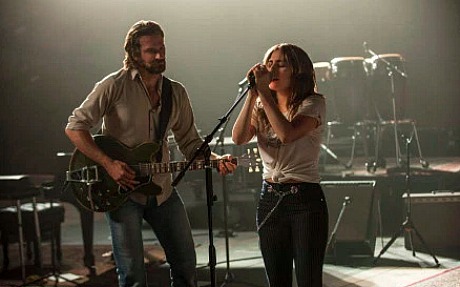Last Thursday (4.13) a major Guardian story (“British Spies Were First To Spot Trump Team’s Links With Russia“) about Russian-Trump collusion appeared. The 34th and final paragraph says the following: “One source suggested the official [American] investigation was making progress. ‘They now have specific concrete and corroborative evidence of collusion,’ the source said. ‘This is between people in the Trump campaign and agents of [Russian] influence relating to the use of hacked material.'” I read a hint of this on Twitter but it didn’t sink in — apologies.
 Jeffrey Wells
Jeffrey Wells
Live And Die By The Sword
The gist of “Smartphones Are The New Cigarettes,” a 4.17 Think Global piece by Mark Manson, is that constantly eyeballing your phone screen and otherwise divorcing yourself from the life’s natural changes and currents is declasse behavior, or something that only low-lifes are succumbing to. Those with class and cultivation are dodging that stereotype with a passion, he’s saying, and if you’re still acting like a mutt you should probably reassess things.
Speak for yourself, pal. I’m well aware of the declasse aspect and am always careful not to yank my phone out in mixed company, and if so only for a minute or less. But in my own lone-wolf realm I’m a three-pack-a-day man, especially with the constant copy editing, searching for ideas and the endless twitter duelling, and that will never change. Like, ever.

Will All Movies One Day Be Watched With One Eye While Checking Twitter Feeds?
In a 4.17 Indiewire piece, critic David Ehrlich laments the impression that Netflix movies aren’t really movies because the only theatrical experience they’ll receive is at this or that film festival. Because once they turn up on Netflix, they’re just part of the churning digital swarm on this or that device. As Ehrlich puts it, it’s the fate of all Netflix movies to be “quietly uploaded to a computer server and added to an ever-expanding menu of content in the cloud. I saw it in a theater; you’ll see it buried somewhere between Iron Fist and Sandy Wexler.”
If I had labored hard and gone into heavy debt to make a feature film, I would be overjoyed if Netflix picked it up because at least I would be made whole and could then go on to make another film. But I would also feel a bit drained knowing that my film will never experience the slightest theatrical pulsebeat.

In the eyes of many Amazon is doing it right with their commitment (recently reiterated at Cinemacon) to give new films some kind of theatrical exposure before streaming them. In Ehrlich’s view, a Netflix acquisition means being sent to a kind of digital elephant’s graveyard.
“If a movie premieres on Netflix, is it still even a movie?,” he writes. “In an age where the word ‘film’ is often a misnomer and content is classified less by the intent of its production than by the means of its distribution, it could be said that movies — at least for the time being — are simply things that play in movie theaters. It may seem like a matter of semantics, but I think we’re talking about qualitatively different experiences.
Clock Coming Round on LAFF
Will the 2017 L.A. Film Festival follow the mindset of the ’16 and ’15 fests, which was basically to screen lower-profile, hand-to-mouth indie titles that no one had heard of or wanted to see? Or will they program at least a few not-yet-released films screened at Sundance, Tribeca or Cannes?

Posted on 5.30.16: “The L.A. Film Festival (6.1 thru 6.9) feels like a no-buzz flatliner. So far I’ve noticed three or four films of passing interest but nothing that really heats the blood. Just a lot of indie titles of marginal interest. No hot premieres, minor Sundance repeaters, none of the Cannes headliners. I shared this view with a film-savvy friend and he said ‘my impression is the same as yours…I felt like last year’s LAFF had almost no buzz, and this year it has even less.’
The Clarity Of Mind That Comes To A Man Standing On The Gallows
If I’ve said this once I’ve said it 100 times. If you’re a 60-plus actor you need to lose the droopy neck wattle. It’s about as complex as having your teeth cleaned, and if your surgeon isn’t a complete idiot it won’t look like anything. You can still look weathered and grizzled and all that other other sexy saddlebag stuff. You can even keep a slight neck wattle, but droopies are impossible. And Sam Elliott knows this. Joe Biden‘s neck wattle has been driving me crazy, and he refuses to do the thing. It’s like walking around with your fly open.
From a 1.21.17 Hollywood Reporter review, written by John Frosch: “In The Hero, unlike in most of his other projects, Elliott appears in nearly every frame as Lee Hayden, an over-the-hill Western film star whose cancer diagnosis prompts him to plan a comeback, reconnect with his estranged daughter and romance a younger woman. If that story sounds familiar, it’s because you’ve seen it before, with tweaks and variations, in movies like The Verdict, Tender Mercies, The Wrestler, Crazy Heart and many more.
Three Things About Latest A Star Is Born
Images from Bradley Cooper‘s A Star Is Born popped over the weekend. They showed Lady Gaga (in the role played by Barbara Streisand, Judy Garland and Janet Gaynor in previous versions of this time-worn tale) and Cooper (in the downswirling drunk role played by Kris Kristofferson, James Mason and Fredric March) performing before cameras at Coachella. The Warner Bros. film will pop sometime in ’18, most likely in the fall.

Bradley Cooper, Lady Gaga during filming of a Star Is Born concert-performance scene at Coachella.
The press-release takeaway is that Lady Gaga will be billed by her actual name — Stefani Germanotta. Which has to be one of the dopiest big-studio kowtowings to a headstrong celebrity in history. By the time the movie opens everyone will know this is just an ego game — a way of Lady Gaga saying “I’m extra-special” or “being an artist, I have to be extra-real with myself in order to play this role…it’s essential to my process.” Except this is a partial copout because LG’s actual real name is Stefani Joanne Angelina Germanotta.
A second, very fundamental aspect is that millions don’t have a clear idea what Lady Gaga actually looks like. LG has been a glammy image-changer and clotheshorse for years, and so heavily made up and be-wigged that all anyone really knows is that she sings well and has prominent cheekbones. If I were to run into an au natural Miley Cyrus doing lunch at Le Pain Quotidien, I would say to myself, “Huh, Miley Cyrus without makeup.” If I were to encounter Lady Gaga in workout duds nothing would register. Okay, I might say to myself “hmmm, interesting face…do I know her?”
A third aspect (and I’ve said this repeatedly) is that stories about drunks are boring. There’s nothing the least bit touching about a person who can’t help killing his/her career because he/she can’t face facts and get sober. Many successful entertainers find they can’t keep the fire going or, worse, fall by the wayside when they let alcohol or drugs carry the load. I feel a measure of sympathy for anyone caught in a self-destructive pattern (having sworn off the hard stuff 21 years ago and embraced sobriety on 3.20.12), but the idea of paying to see a tired story about a talented person slowly turning into a boorish asshole as he/she slips beneath the waves is, well, inconceivable. To me at least.
By The Sea
Posted 4.16, 10:05 pm: Today’s excursion involved El Matador, La Piedra and Pescador beaches — a couple of miles north of Trancas. Walking from beach to secluded beach, crawling through caves, getting soaked at one point and a bit sunburned overall. Drove up Kanan Dume Road to Mulholland Highway and then east to The Old Place, which was too noisy and crowded and too much of a wait.

Blake Edwards’ Sunset [posted 4.16, 1:13 pm]: Every tourist who’s ever visited Santa Monica has taken this exact same shot. But there I was yesterday on the big bluff. The SRO and I had pedaled out from West Hollywood (Santa Monica Blvd. all the way) and then down to the beach bike path, all through S.M. and Venice and back again. I hadn’t meditated upon a Pacific sunset in several years, and so we did. (It was Tatyana’s first time.) An hour later we put the bikes on the front rack of an eastbound #4 bus, and were back home by 8:30 pm.

No Promises
I haven’t bothered to watch Sandy Wexler, the new Adam Sandler movie for Netflix. Mainly because I was afraid. I don’t want to sit through a softer, more congenial Broadway Danny Rose or All That Jazz. At all. If I catch it tonight I’ll write something…maybe.
Kidman File
Soon after the 4.2 finale of HBO’s Big Little Lies it was clear that Nicole Kidman‘s performance would be getting the big Emmy push. The pushing will last several weeks as Emmy nomination voting runs from 6.12 to 6.26. The articles and tweets have mostly advanced the career-tribute narrative — it’s not just Kidman’s turn as Celeste-the-abused-wife but her whole 28-year career. If you count Dead Calm as the beginning, I mean.
That’s a pretty good trick considering that over the last six or seven years Kidman has made herself into a kind of Queen of the Indie Bs, giving her all in one eye-rollingly bad, mezzo-mezzo or not-good-enough film after another — Trespass, The Paperboy, Stoker (which I hated), The Railway Man, Grace of Monaco (grotesque), Before I Go to Sleep, Paddington, Strangerland, Queen of the Desert, The Family Fang (a decent film that quickly disappeared), Secret in Their Eyes and Genius. Yes, Kidman was reasonably okay in Lion but don’t get carried away.
Kidman will soon be seen in the Geraldine Page role in Sofia Coppola‘s The Beguiled (Focus, 6.23). She’ll have three films in Cannes — The Beguiled, Yorgos Lanthimos‘ The Killing of a Sacred Deer and John Cameron Mitchell‘s How To Pick Up Girls At Parties.
What Kidman performances have really and truly earned the gold medal? 13 in all. I’ve listed them not in order of preference but sequence: Dead Calm (’89 — I knew when I first saw this that Kidman had “it”), My Life (’93 — Michael Keaton‘s taller wife standing by as he dies of cancer), To Die For (’95 — probably her pinnacle performance — certainly the cleanest and most confident), Moulin Rouge! (’01), The Others (’01), Birthday Girl (’01), The Hours (’02 — “by a nose”), Dogville (her second best ever, just a notch behind To Die For), The Human Stain (’03), Birth (’04), The Interpreter (’05 — I have a soft spot for this Sydney Pollack film), Margot at the Wedding (’07) and Rabbit Hole (’10)
I’m glad that Kidman has achieved a kind of bounce-back effect with Big Little Lies. But there’s no disputing she’d been in a long, slow downswirl cycle for seven years prior. On the plus side she had a vivid, luminous career for 21 years before that (i.e., starting with Rabbit Hole and working backwards).
A Smarter, Savvier Shitheel
Real-estate developer, publisher and Donald Trump son-in-law Jared Kushner, apparently the President’s most trusted and influential adviser, is only seven and a half years older than Jett. On last night’s SNL Alec Baldwin mentioned that Kushner “doesn’t like to talk.” Indeed. Until this morning I’d never heard his voice or listened to him speak about anything.
The below excerpt is from June 2014. Kushner is obviously an amiable blueblood hustler (the onetime Democratic liberal apparently converted to conservatism for purely opportunistic reasons) and for all I know he’s literally Damien Thorne, but listen to his remarks here. He sounds like a comme ci comme ca frat boy, but he’s not stupid. He talks the talk.
If by clapping my hands three times I could eject Trump from the Oval Office and install Kushner in his place, I would do so. Because that would at least mean the death of Steve Bannon and perhaps even Stephen Miller. I can’t believe I’m saying this, but Kushner is clearly smarter and more conversant with the cultural-technological particulars of our time than his father-in-law. Scratch Kushner and you’d find a guy who understands that climate change is 110% real.
Longed-For Demise of Palpatine
Here‘s a nicely composed inside-the-West-Wing piece by Vanity Fair‘s Sarah Ellison, not just about the Jared Kushner-Steve Bannon clash but the constantly shifting ground benath everyone’s feet. Everyone, that is, except for Kushner and Ivanka Trump.
“[Steve] Bannon’s real undoing in the eyes of his boss, according to three people familiar with the situation, involves his perceived attacks through the media against Kushner and Ivanka as liberal Democrats seeking to undermine a more conservative agenda. Bannon’s other big mistake has been taking credit for Trump’s own popularity, such as it is.

Vanity Fair illustration by Darrow.
“Referring to [Bannon’s] Time cover, a senior administration official told me, ‘He is very talented at making himself seem the hero of the conservatives who elected Donald Trump’ — the implication being that if you lose Bannon, you lose them. ‘It’s a very smart thing to do on his part,’ this official added, ‘but ultimately it’s not a sustainable strategy for him. The president sees through that kind of thing, and he’s aware of what’s happening.”
“The official went on: ‘The reality is, if he keeps this up he’s not going to be here.’
“Another strike against Bannon is that, when speaking of the Freedom Caucus ahead of the planned vote on repealing the Affordable Care Act, he assured the rest of the senior team, ‘I’ve got these guys taken care of,’ according to someone close to the West Wing. ‘We don’t have to worry about them.'”
